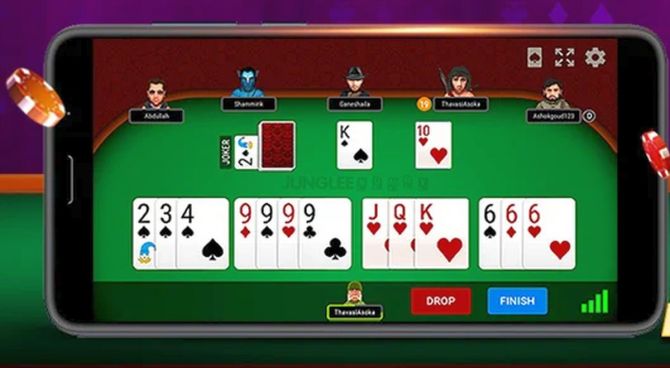The Madras high court on Thursday declined to declare the entire Tamil Nadu Prohibition of Online Gambling and Regulation of Online Games Act, 2022, as ultra vires the Constitution and held rummy and poker as 'games of skill.'

It set aside the Schedule of the Act incorporating rummy and poker as games of chance in the list of banned games.
The Tamil Nadu government had introduced the legislation earlier following a spate of suicides allegedly over monetary loss in online gambling.
The first bench comprising Chief Justice S V Gangapurwala and Justice P D Audikesavalu partly allowed the writ petitions filed by All India Gaming Federation and other online gaming companies, which challenged the Act.
"We hold that the impugned Act, in its entirety, need not be held to be ultra vires. It is held that the state is competent to legislate to the extent of prohibiting online gambling, ie, games of chance, at the same time, it has got the authority to regulate online games of skill. The definition of "online gambling" under Section 2(i) of the impugned Act shall be read as restricted to "games of chance" and not games involving skill. ..the games of rummy and poker are games of cards, but are games of skill," the bench said.
The bench said having held that the state has got the authority to legislate on online games of chance, as gambling would be betting on the games of chance, it was not necessary to declare Sections 7, 8 and 9 of the impugned Act as ultra vires. It has been authoritatively held by the apex court in a catena of judgments, so also this court that the games of rummy and poker were games of skill.
The state has miserably failed to demonstrate online games of rummy and poker were different and distinct from offline games of rummy and poker. The apprehension expressed by the state that bots may be used or the dealer (software) would know the cards were without any substantive material. In view thereof, the Schedule under Section 23, incorporating rummy and poker as games of chance, was set aside, the bench added.
The bench said the state may make regulations as contemplated under Section 5 of the impugned Act, thereby providing reasonable regulations for the time limit, age restriction or such other restrictions in regard to playing of online games.
Section 10 of the impugned Act may not be declared as ultra vires as it will be necessary for the state to know about the online games providers operating within its state and that they were not indulging in any games of chance.
If the state comes across the usage of bots or any dubious methods in the play of games of rummy and poker, it can take action and for that purpose also it will be necessary to uphold Section 10 of the impugned Act. The State may frame regulations as contemplated under Section 5 of the impugned Act, the bench added.
"In the light of the aforesaid, the writ petitions, as such, stand partly allowed. The prayer to declare the entire impugned Act of 2022 as ultra vires is negated. The Schedule of the impugned Act, including the games of rummy and poker, are set aside. Sections 2(i) and 2(l)(iv) of the impugned Act shall be read as restricted to games of chance and not games involving skill, viz, rummy and poker," the bench added.
The court said it was to be considered that the online games, in the instant case, were not available for persons/children below the age of 18 years. Online games can be played only by those who were 18 years and above, ie, who were major and not school children.
The apprehension raised by the senior counsel for the state was that there would be no methodology to verify the age of the person playing. The petitioners responded to it by suggesting that a person, before he enrols to play, was required to submit his Aadhaar card, photograph and other precautionary measures were taken to confirm that the person playing was 18 years old or more, the bench added.
It said another apprehension of the state government was that the games were played 24 hours, thereby endangering the public and domestic health. The concern expressed by the state about the public health of its citizens was but natural.
The state has to take care of the public health of its citizens. Section 5 of the impugned Act authorises the authority, by notification and with the previous approval of the government, to make regulations to carry out the provisions of the Act namely, time limit, monetary limit, age restriction or such other restrictions in regard to playing of online games.
The state certainly has the power to regulate online games of skill. It can control and regulate the games of skill. The State can provide for the time limit and it would have the necessary infrastructure and expertise to take all the measures that the games would not be played within the State after a particular time. It can also regulate the age restriction and other aspects. The same would be within the competence of the state, the bench added.
The bench said another apprehension raised by the state was of public order. Public order in the State List would imply activities that would jeopardise and affect public at large.
The apex court in the case of Ram Manohar Lohia observed that "every breach of the peace does not lead to public disorder. When two drunkards quarrel and fight there is disorder but not public disorder. They can be dealt with under the powers to maintain law and order but cannot be detained on the ground that they were disturbing public order."
"Suppose that the two fighters were of rival communities and one of them tried to raise communal passions. The problem is still one of law and order but it raises the apprehension of public disorder. Other examples can be imagined. The contravention of law always affects order but before it can be said to affect public order, it must affect the community or the public at large. A mere disturbance of law and order leading to disorder is thus not necessarily sufficient for action under the Defence of India Act but disturbances which subvert the public order are....".
There was no evidence in the instant case that public order was disturbed, the bench added.









